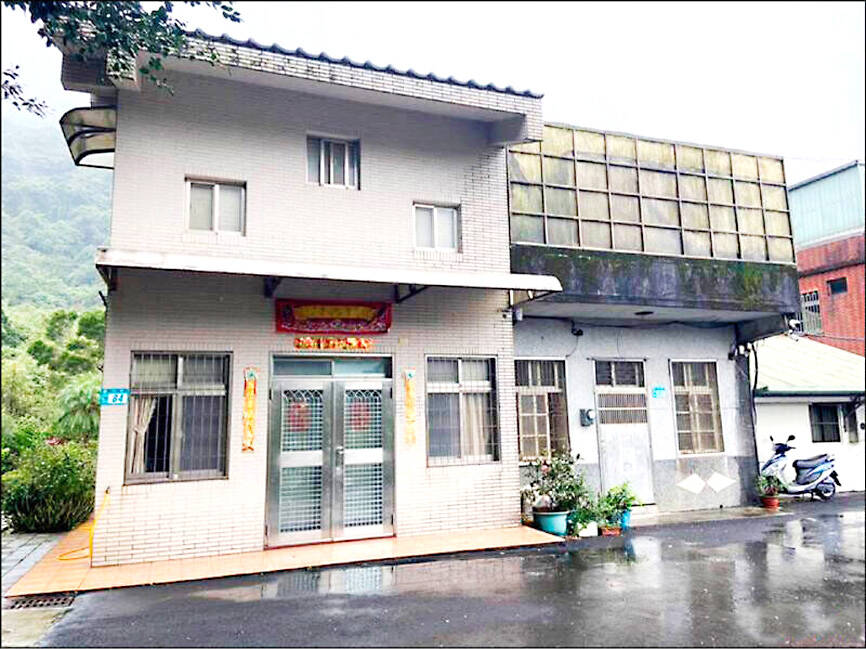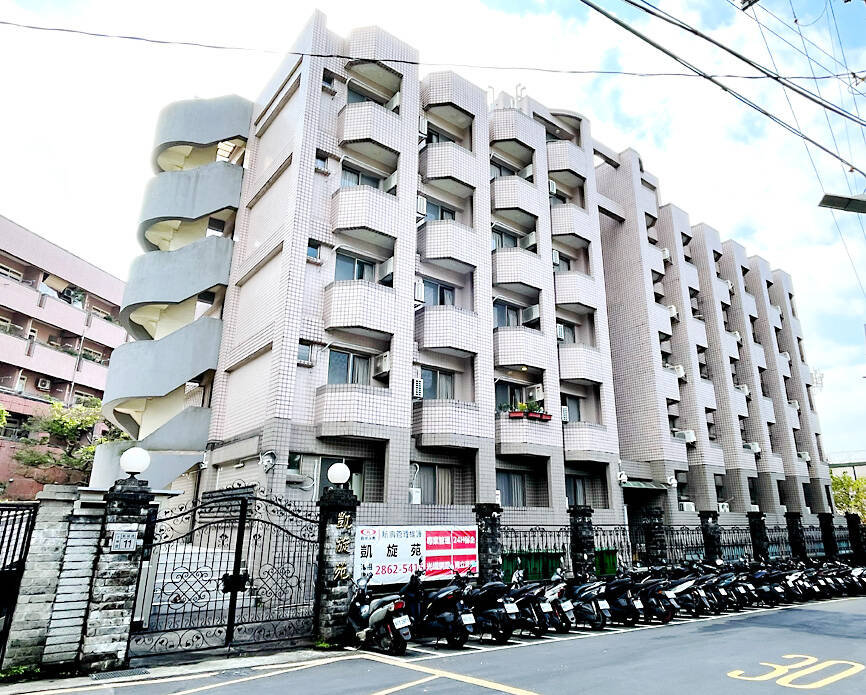The Democratic Progressive Party (DPP) and the New Taipei City Government are embroiled in a dispute regarding the construction timeline of the DPP presidential candidate’s property, with each side presenting evidence that paints contrasting narratives.
The New Taipei City Land Administration Department yesterday issued a statement saying DPP presidential candidate Vice President William Lai’s (賴清德) family home had been “constructed from ground level in 2003” and published aerial photographs it claimed to be evidence.
Lai’s campaign spokesperson Kuo Ya-hui (郭雅慧), meanwhile, countered the local government’s statement by presenting Lai’s family household certificate, which she said was evidence that the house in Wanli District (萬里) had existed since 1958.

Photo: Taipei Times
She said that the house had since undergone on-site renovation, but it was not a new building.
The ongoing sparring intensified on Sunday when the city government claimed the house was not similar to surrounding buildings, in an apparent response to Lai saying that the house had existed since 1958.
Kuo replied on Sunday evening that Lai’s childhood home had been standing since 1958 and that it was where he was “born and raised.”

Photo: Chu Pei-hsiung, Taipei Times
She expressed bewilderment as to why the department was continuing to release “biased news statements.”
Determining the year of construction is crucial because it could result in the building being deemed an illegal structure.
The city government in September said that the house could only be acknowledged as a legal building if the owner provided evidence that the structure predated 1981.
Lai emphasized during a policy presentation last week that all work on the structure had been completed before 1974, when the Regional Planning Act (區域計畫法), which prohibits unauthorized expansion, was passed.
The dispute surrounding Lai’s family home in New Taipei City has been in the headlines for months.
Both the Chinese Nationalist Party (KMT) and the Taiwan People’s Party (TPP) have repeatedly accused Lai’s family of illegally expanding the property and claimed that the building should have been torn down by the city government years ago.
TPP legislator-at-large nominee Huang Kuo-chang (黃國昌) has also accused Lai of not paying housing taxes on the Wanli property for more than two decades and demanded the payment of back taxes and the imposition of a fine.
In response to the criticism, Lai reiterated during a policy presentation last week that his old family home was one of the hundreds of renovated miners’ housing units built decades ago in New Taipei City, where there were once several mining districts.
However, over the years the mining companies closed down and many of the small units were purchased and renovated into larger buildings for safety reasons, Lai said.
Lai and TPP Chairman and presidential candidate Ko Wen-je (柯文哲) traded barbs on the matter over the weekend, with Ko saying that the way Lai has dealt with the housing issue suggests he “definitely would be a dictator,” in a video message played at a labor protest in Taipei.
KMT presidential candidate Hou You-yi (侯友宜) is the incumbent New Taipei City mayor. He took a leave of absence in September to run for the top job.
Meanwhile, the DPP has criticized Hou over the Kaisuan Condominium (凱旋苑), formerly known as the Da Chiun Building (大群館), which is owned by Hou’s family and is used as off-campus housing for Chinese Culture University students.
The DPP yesterday criticized Hou for hiking the dorm rent every year and being “greedy” for taking money from young people.
The number of rooms inside the dorm increased from 99 to 103, and the DPP alleged the increase was so it could have more rooms to rent out “and suck the blood from students.”
The action is a reflection of Hou caring only about his self-interest and not that of the young people’s plight, the DPP said.
In response, Hou yesterday said his wife inherited the property from her family 20 years ago and that it is not ilegally built and taxes are paid in line with the law.
Additional reporting by Chen Cheng-yu

US climber Alex Honnold is to attempt to scale Taipei 101 without a rope and harness in a live Netflix special on Jan. 24, the streaming platform announced on Wednesday. Accounting for the time difference, the two-hour broadcast of Honnold’s climb, called Skyscraper Live, is to air on Jan. 23 in the US, Netflix said in a statement. Honnold, 40, was the first person ever to free solo climb the 900m El Capitan rock formation in Yosemite National Park — a feat that was recorded and later made into the 2018 documentary film Free Solo. Netflix previewed Skyscraper Live in October, after videos

Starting on Jan. 1, YouBike riders must have insurance to use the service, and a six-month trial of NT$5 coupons under certain conditions would be implemented to balance bike shortages, a joint statement from transportation departments across Taipei, New Taipei City and Taoyuan announced yesterday. The rental bike system operator said that coupons would be offered to riders to rent bikes from full stations, for riders who take out an electric-assisted bike from a full station, and for riders who return a bike to an empty station. All riders with YouBike accounts are automatically eligible for the program, and each membership account

A classified Pentagon-produced, multiyear assessment — the Overmatch brief — highlighted unreported Chinese capabilities to destroy US military assets and identified US supply chain choke points, painting a disturbing picture of waning US military might, a New York Times editorial published on Monday said. US Secretary of Defense Pete Hegseth’s comments in November last year that “we lose every time” in Pentagon-conducted war games pitting the US against China further highlighted the uncertainty about the US’ capability to intervene in the event of a Chinese invasion of Taiwan. “It shows the Pentagon’s overreliance on expensive, vulnerable weapons as adversaries field cheap, technologically

Temperatures are forecast to drop steadily as a continental cold air mass moves across Taiwan, with some areas also likely to see heavy rainfall, the Central Weather Administration (CWA) said. From today through early tomorrow, a cold air mass would keep temperatures low across central and northern Taiwan, and the eastern half of Taiwan proper, with isolated brief showers forecast along Keelung’s north coast, Taipei and New Taipei City’s mountainous areas and eastern Taiwan, it said. Lows of 11°C to 15°C are forecast in central and northern Taiwan, Yilan County, and the outlying Kinmen and Lienchiang (Matsu) counties, and 14°C to 17°C